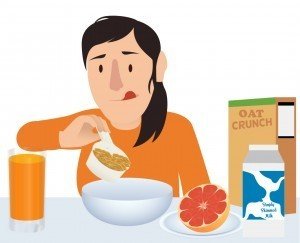Be a Serving Size Sleuth
 One of the many roadblocks to healthful eating is overeating. This can happen when we eat mindlessly when multitasking or when we don’t know what the intended portion size of our food looks like. Not knowing this information can ruin our best intentions. One way to prevent overeating is to be mindful of serving sizes. Here are some tips on how to mind your portions and become a Serving Size Sleuth…Tip #1: Know The FactsFood packages come with a Nutrition Facts label that offers information about the portion size of that food, along with how many servings are in each package. Reading these labels before making a food purchase will help you decide if the item fits your nutrient needs, and if the serving size will satisfy your hunger.Tip #2: Mind Your MeasurementsMost people overestimate portion sizes and this can lead to unintended calorie intake.Here’s a challenge: For one week, measure your portions using tools like measuring cups, measuring spoons, and a kitchen scale. From this exercise, you might be surprised to find that you are eating two portions of cereal or four portions of cheese, instead of one of each. After a week, you will be able to visualize the correct serving sizes of the foods you eat on a regular basis. If your memory starts to fade, you can always go back to using your measuring tools at any time.Tip #3: Give Yourself a Hand (or a Thumb)Don’t have access to measuring tools when dining away from home? No problem! You can use your hands as a quick reference for sizing up portions. For instance, a three-ounce piece of chicken or beef is roughly the size of your palm. One-half cup usually fits in one open, cupped hand, and one cup is about the size of a closed fist. Your thumb works well as a gauge for smaller amounts; the whole thumb is equivalent to one tablespoon, and the tip of the thumb to the first joint is about the same as one teaspoon.Serving size doesn’t have to be a mystery or an after-thought on the journey to healthy eating. Now that you have the right tools, unintended calorie intake will be a pitfall of the past and one less roadblock to a lifetime of practicing healthy habits.By Beth Rosen, MS, RD, CDN
One of the many roadblocks to healthful eating is overeating. This can happen when we eat mindlessly when multitasking or when we don’t know what the intended portion size of our food looks like. Not knowing this information can ruin our best intentions. One way to prevent overeating is to be mindful of serving sizes. Here are some tips on how to mind your portions and become a Serving Size Sleuth…Tip #1: Know The FactsFood packages come with a Nutrition Facts label that offers information about the portion size of that food, along with how many servings are in each package. Reading these labels before making a food purchase will help you decide if the item fits your nutrient needs, and if the serving size will satisfy your hunger.Tip #2: Mind Your MeasurementsMost people overestimate portion sizes and this can lead to unintended calorie intake.Here’s a challenge: For one week, measure your portions using tools like measuring cups, measuring spoons, and a kitchen scale. From this exercise, you might be surprised to find that you are eating two portions of cereal or four portions of cheese, instead of one of each. After a week, you will be able to visualize the correct serving sizes of the foods you eat on a regular basis. If your memory starts to fade, you can always go back to using your measuring tools at any time.Tip #3: Give Yourself a Hand (or a Thumb)Don’t have access to measuring tools when dining away from home? No problem! You can use your hands as a quick reference for sizing up portions. For instance, a three-ounce piece of chicken or beef is roughly the size of your palm. One-half cup usually fits in one open, cupped hand, and one cup is about the size of a closed fist. Your thumb works well as a gauge for smaller amounts; the whole thumb is equivalent to one tablespoon, and the tip of the thumb to the first joint is about the same as one teaspoon.Serving size doesn’t have to be a mystery or an after-thought on the journey to healthy eating. Now that you have the right tools, unintended calorie intake will be a pitfall of the past and one less roadblock to a lifetime of practicing healthy habits.By Beth Rosen, MS, RD, CDN
